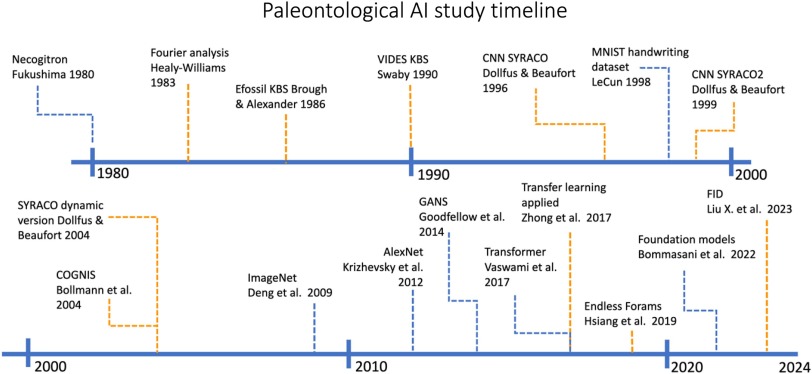A comprehensive review published in the “Earth-Science Reviews” journal on April 2024, delves into the burgeoning role of artificial intelligence (AI) in paleontology. The study, authored by Congyu Yu with an international cooperation team, examines over 70 AI-based paleontological studies since the 1980s, emphasizing the transformative impact of AI on the field.
Paleontology, traditionally reliant on manual workflows and fossil-driven studies, faces challenges due to the growing quantity and complexity of data. The review highlights how AI techniques, such as neural networks, transfer learning, and knowledge-based systems, have automated various paleontological tasks, including fossil classification, image segmentation, and evolutionary prediction.

Fig Major progress in paleontological AI study development
The authors point out that while AI has been widely adopted across scientific disciplines, its application in paleontology is still in its infancy. The increasing availability of large datasets and advancements in AI have lowered the entry bahhiers, making it feasible for researchers to implement AI in their studies. This shift towards data-driven methodologies is revealing unprecedented insights into evolutionary history.
Notably, the review discusses innovative AI applications, such as diffusion model content generation and Large Language Models (LLMs), which hold promise for future paleontological research. These advancements could significantly enhance the accuracy and efficiency of data analysis, leading to a deeper understanding of evolutionary processes and patterns.
The importance of this review lies in its potential to pave the way for a new era in paleontology. By showcasing the successful implementation of AI, it encourages researchers to adopt these technologies, ultimately transforming the field. The integration of AI in paleontology not only streamlines research processes but also provides more comprehensive and accurate interpretations of fossil data. This paradigm shift is expected to revolutionize the way paleontologists study ancient life, offering new perspectives and methodologies that were previously unimaginable.
——
REFERENCE
Yu, C. et al. 2024. Artificial intelligence in paleontology. Earth-Science Reviews, 252: 104765. https://doi.org/10.1016/j.earscirev.2024.104765